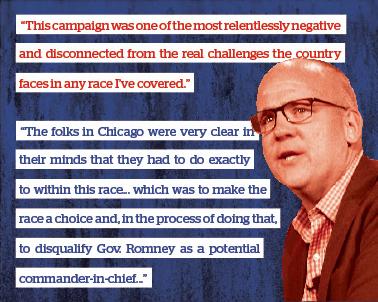MSNBC political analyst and “Game Change” co-author John Heilemann declared Friday that both President Barack Obama and former Massachusetts Gov. Mitt Romney ran presidential campaigns not up to par by either man’s standards.
In an hour-long talk at the McCormick Tribune Center, Heilemann (Medill ’87) told about 100 attendees that the candidates’ bids for the White House were “the most relentlessly negative” campaigns he has seen in two decades covering presidential politics.
“They’re good men and serious guys, and they ran a campaign that really was not worthy of them — either one of them,” Heilemann said. “And they ran a campaign that wasn’t anywhere near worthy of the real challenges the country faces in terms of policy, in terms of the size of the challenges and … the immediacy of the challenges.”
Heilemann became a household name three years ago after he helped pen one of the most popular insider accounts of the 2008 presidential election. HBO later turned “Game Change” into a critically acclaimed movie focusing on Arizona Sen. John McCain’s selection of former Alaska Gov. Sarah Palin as his running mate.
Writing the blockbuster book put Heilemann in the front row for the political ascendancy of Obama, who has known Heilemann since the late 1980s. Heilemann recalled that the future commander-in-chief — “this tall, thin, striking African-American guy” — asked to borrow a cigarette outside Harvard University’s law school library in their first encounter.
Heilemann said the second coming of “Game Change” will not arrive until next year but still offered a bird’s-eye view of the grassroots machine that powered Obama’s re-election Tuesday night.
He pointed to a consistent batch of swing states in which Obama’s brain trust was dedicated to turning out black, Hispanic, college-educated female and young voters.
“They were looking at nine states, those four groups,” Heilemann said. “And they spent a year and a half doing nothing but camping out in nine states and spending a billion dollars and figuring out at any given level of voting how many votes they needed from each one of those groups to win those states.”
The campaign’s laser-like focus paid off: Obama captured every battleground state on his way to locking up more than 330 electoral votes on Election Day.
Heilemann said he recalled bumping into White House senior adviser David Plouffe on the campaign trail Monday and feeling skeptical as Plouffe ticked off his predictions for the president’s performance in each key state.
“Every margin that he gave me was within one point of what they got the next day,” Heilemann recalled. “I’ve got to say — I’m a cynical, jaded guy who’s done six of these presidentials and a lot more gubernatorial and senatorial elections. I’ve never seen people that confident, and I’ve never seen their confidence so totally bore out by the result. It was precision.”
Heilemann said Obama’s strategy “blows apart” the political science theory that campaigns do not matter and election outcomes are often predetermined by economic indicators. He compared the Obama campaign’s ground game to a supercomputer and Romney’s operation to a few pocket calculators.
Moving forward, Heilemann cautioned that the GOP cannot survive as a national party if it continues to attract minimal support from the same four constituencies that lead Obama’s coalition.
“There’s no reason the Republican Party can’t be conservative but modern,” Heilemann said. “You could be pro-life and still pro-contraceptive. You don’t have to be a climate science denialist to have a different position on how to deal with that.”
Heilemann was only in town for hours but told Medill staffers to keep circulating microphones to audience members, even if taking their questions meant missing his flight home. He did manage to take in one Evanston institution during the trip — he said he stopped by Dempster Street hot dog stand Wiener and Still Champion earlier Friday afternoon.
— Patrick Svitek

